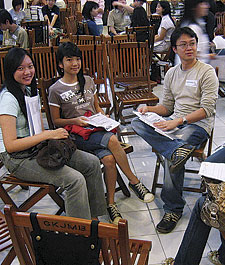After running Jakarta’s first ever KYLC-style conference earlier this year, Unichurch’s Indonesian ministry is tackling the problem of nominalism on campus.
The conference " entitled Build " was held earlier this year, attracting over 80 Indonesians, who were mostly university students, with some year 12 students and some young graduates and workers.
 The Gereja Kristen Pelita (GKP) " Unichurch’s ministry to Indonesian students " ran the conference in conjunction with Indonesian churches “that we knew had a high regard for the Bible,” says GKP’s full-time pastor, the Rev Charles Gajus.
The Gereja Kristen Pelita (GKP) " Unichurch’s ministry to Indonesian students " ran the conference in conjunction with Indonesian churches “that we knew had a high regard for the Bible,” says GKP’s full-time pastor, the Rev Charles Gajus.
While the conference is not officially a part of the ministry of Katoomba Youth Leadership Conference, KYLC gave permission for their material to be adapted and translated for the three-day conference, which also featured expository Bible teaching and workshops on biblical exegesis.
In a country where nominalism is high among Protestant Christians, Build is a response to "the need for Indonesian youths to take Jesus Christ seriously," says Mr Gajus.
This nominalism stems in part from the requirement that every citizen indicate their allegiance on their ID card to one of Indonesia's six officially recognised religions: Islam, Protestantism, Roman Catholicism, Hinduism, Buddhism and Confucianism.
Students finding Christ in their Christianity
This nominalism has extended to Indonesian students living in Sydney, but Mr Gajus indicates it is a wonderful problem. "This means that many people who think they know Jesus and the Bible come and join Pelita thinking that they are Christians, only to find out after reading the Bible with us that they aren't."
The Gereja Kristen Pelita (literally: church Christian lamp) grew out of FOCUS (Fellowship of Overseas Christian University Students) around 10 years ago, with Mr Gajus " who had worked with GKP since 1991 " becoming the ministry’s full-time pastor last year.
What started as a 30-strong fellowship meeting on Friday nights has grown to a ministry with over 80 regular members. Now the GKP also runs a Sunday morning church service, small groups during the week and Tuesday night training in evangelism.
There are 749 Indonesians studying at UNSW this year, the fourth largest nationality among the international student community. Mr Gajus says having an Indo-specific ministry means Indonesians can hear the gospel in their own language and ask their questions "in a less threatening way".
"For their short stay with us, we want the Indo Christians to use their "gift' of being Indonesian to reach out to other Indonesians who may not listen to the gospel from anyone else."
One of Charles' challenges is to encourage students to return to their homeland armed with the gospel, rather than migrating from the difficulties of living as a Christian in a heavily Muslim society. "We are always challenging people to keep making gospel decisions, knowing that the Christian walk is the way of the cross," he says.
For food technology student, Frida Levina, this is a given. "It gives a great comfort that God is working in people's hearts all around the world, including Indonesia, and knowing that they do love the gospel and love to share it with other people has encouraged me to be trained more" and to pray more for the work of the gospel in Indo."



















